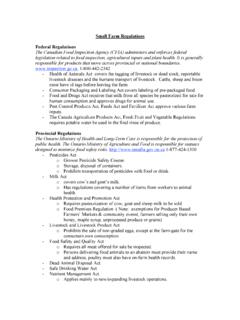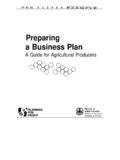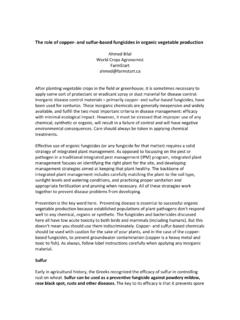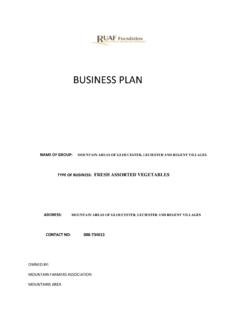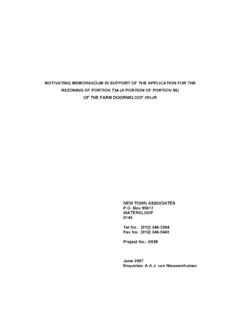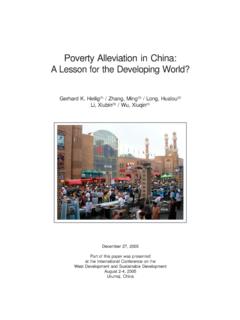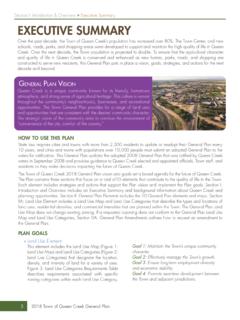Transcription of A guidebook for farm seekers and farmland owners Edition 1
1 FarmStart & Everdale Environmental Learning CentreAvailable as a free download on our websitesA guidebook for farm seekers and farmland owners | Edition Land for FarmingIn Ontario A guidebook for farm seekers and farmland owners Edition AuthorPat LearmonthContributing AuthorsAmy DarrellAlexandra EnglishLaurie ThomasMelissa WatkinsTarrah YoungIllustrationsMichael ByersThe development of this guidebook was made possible through the support and financial assistance of Everdale Environmental Learning Centre, FarmStart, and the George Cedric Metcalf Charitable Foundation. It is not intended to provide legal or financial advice. Accessing Land for Farming in Ontario 1 TABLE OF 2 ACCESS TO LAND FOR A. USING SOMEONE ELSE S LAND ..4 B. BUYING .. 19 RESOURCES .. 20 2 Accessing Land for Farming in OntarioOVERVIEW Over the last decade or so, the public has found a renewed interest in food where it comes from, and how it is produced and processed.
2 This interest, in turn, has spurred a new group of people to take an interest in producing food, especially for local markets. Many of these individuals have not grown up in the farming community and have limited access to capital. Many are young people, whose parents or grandparents may have been part of the migration o! the farm in previous decades. Others are immigrants with plenty of skill but little capital. Some are second-career individuals, looking for a change of direction. These new farmers may be looking to purchase land or for alternative ways to access farmland that is a!ordable and the same time, large numbers of baby boomer farmers are selling their farms in order to access the capital they need to retire. Over the next 15 years as many as one half of Ontario s current farmers will retire, leaving perhaps 1% of the province s population on active farms. Most of their farms will be sold outside the family.
3 Non-farmers, as well as investors and developers, are frequent purchasers of these farms. This is driving the price of farmland beyond the means of most new farmers, especially in areas close to the same urban markets that are clamouring for local food . These factors combined are creating a new dynamic between the owners of farmland and farmers. Increasingly, farmland is being farmed by tenants under a wide variety of creative arrangements, which may or may not involve traditional rental guidebook has been developed to assist farmers, especially new farmers, who are looking to rent or buy land for farming, and also farmland owners looking for someone to use their land for To Use This GuidebookThis guidebook is intended as a practical guide or road map, facilitating preliminary discussion between a farm seeker and a farmland owner . It will help you both think through the many choices you have in order to arrive at the best possible arrangement.
4 It is quite common for a farmland owner and a farm seeker to meet and to not feel ready to develop an agreement. Here are some things to consider before you begin to work through this guide with a farm seeker or farmland owner , so that you feel adequately prepared and are more likely to develop a successful arrangement. Be clear about your short and long term goals for your farmland or new farm business. Clarify your financial, environmental and quality of life goals so that you can communicate them to the other person. Good communication is critical to making this work. Take some time to learn more about what makes for good communication and think about how you might employ those strategies as you move forward. As a farm seeker, specifically: Take the time to develop the skills you need to start and manage a farm business. Working and learning on someone else s farm before you begin your own business will save you countless mistakes and loads of money.
5 Develop a business plan or at least a farm vision that you can communicate to the landowner. Know what you are looking for in a farm and the surrounding community (ex: soil and climate, infrastructure, proximity to markets, access to farm and community services). There is no magic formula. Every agreement is individual and you need not be restricted by the names given to arrangements you have seen, sample agreements or even what has worked for someone else. The most important thing is for you to record your ideas for an arrangement that works for both parties in your specific situation. If you have to, you can always adjust your plan after obtaining legal advice. Accessing Land for Farming in Ontario 3 Preliminary discussions help to create a relationship of trust, especially where the parties do not know each other. Making sure both parties believe their plan is really fair will help eliminate misgivings that may sour the relationship later.
6 Particularly in a rental situation, both parties must think through the implications of their relationship in detail. As a farm seeker, you are building a business, putting time and money into improving the land and setting up infrastructure for your operation. Moving from farm to farm is not financially wise, and takes time away from your core work. As a farmland owner , you may be o!ering daily access to your home farm to another farmer. For both of you, discussing and eliminating future sources of friction should be a high priority, as it will increase the likelihood of a successful relationship. This guidebook does not address the purchase of a farm business. It also generally assumes that, even if the owner of the land is farming, his or her farm business is separate from that of the farm seeker. Put It On PaperPerhaps you have heard the old saying good fences make good neighbours . Fences ensure a clear understanding of where a boundary lies, in the same way as written contracts clearly define a relationship.
7 Some agreements are not legally enforceable if they are not written, and every agreement is easier to enforce if it is. Traditionally, many rental agreements in Ontario are based on a handshake with a neighbour. They work because they are usually for the use of additional land for pasture or cash cropping by an established farmer within his or her own community. However you should not assume that a handshake agreement is the best approach for you, and you should not feel that suggesting a written agreement is a sign of distrust. In arrangements involving new farmers without a local farming background: the parties are less likely to be well known to each other, the land is more likely to be used for intensively managed vegetable and/or livestock production (requiring more time on- farm ), the tenant is more likely to make a heavy investment in the soil, and the agreement is more likely to involve some form of sharing of facilities and/or housing for the all these factors, making a detailed record of the terms of agreement is from a Third Party Parties may find it beneficial to either review their workbook answers or work through challenging sections with an unbiased third party prior to seeking legal advice.
8 A mediator or coach may provide constructive feedback or lead both parties closer to agreement on specific issues that would otherwise be left for costly meetings with the lawyers. Appropriate third party help and support may be found through contacting the Canadian Association of farm Advisors (CAFA), FarmStart or through contacting your local economic development organization and enquiring about services for business startups/succession. Third parties may also include other farmers who have successfully been through the same process you are now embarking upon. 4 Accessing Land for Farming in OntarioObtain Legal AdviceOnce the basic terms of your plan have been discussed and recorded, seek legal advice. This guidebook is not intended to provide legal advice. Your preliminary discussions will likely save you considerable legal fees, as your lawyer will be concentrating on fine-tuning the legal aspects of your arrangement rather than sitting in on your discussions.
9 Ask whether there are any legal steps needed to carry out your intended plan. These may include: preparing a signed document containing particular statements, or following particular rules of execution (signing), so that later, if one of you fails to live up to your agreement, the other is protected, or registering a copy of the document against the title of the property to ensure that, if the property is sold, the new purchaser knows about the rental arrangement beforehand (and therefore your rights to use the land are preserved).Any agreement relating to the sale of land must be reviewed by a lawyer and put in writing, as must some lease TO LAND FOR FARMINGIf you don t own farmland and want to farm , you generally have two choices you can use someone else s land or you can buy land. And while buying land may seem like the obvious choice for those who have the available capital, there are some advantages to using someone else s land.
10 These include: not needing capital at start-up freeing up capital to invest in other farm assets avoiding debt providing a testing period (of market, property, location, business idea, general suitability to farming) mentorship and support of landowner A. USING SOMEONE ELSE S LAND The alternative to ownership of the land you farm is arranging the use of someone else s land. From a legal perspective, there are a number of di!erent frameworks (see farmland Access Agreements ) in which this can be done. However, for your purposes, it is probably not too helpful to get tangled up in the legalities. That is what a lawyer is this guidebook , the terms renter and owner will be used to describe the two parties, regardless of the technical legal relationship between them. You, as the renter, could be dealing with an individual landowner, but you could also be talking with an institutional landowner, such as a local government, school, religious order, conservation authority, or land access arrangement may or may not include a cash payment to the owner .
